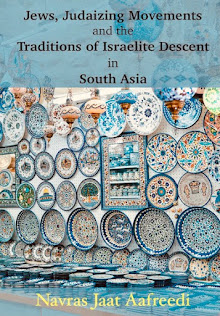Gareth
Narunsky, The
Australian Jewish News, Friday, February 22,
2013
Anti-Semitism
is on the rise among South Asian Muslims, India’s only Jewish studies scholar
warned last week. However, in areas of India where Jews and Muslims have
regular contact, they live in harmony, Dr. Navras Jaat Aafreedi said while
speaking at Sydney’s Waverly Library for Encounters@Shalom.
“The
tiny minority of Muslims which does have direct interaction with Jews – being
neighbours in the cities of Mumbai, Kolkata and Ahmedabad – has an
exceptionally pleasant and cordial relationship with them,” Dr. Aafreedi, an
assistant professor at Gautam Buddha University, said.
“Personal
acquaintance with Jews does not leave any room for negative stereotypes of
Jews.” He explained that all Jews in India live within Muslim areas. “India is
also the only place in the world where Jews can live in peace and in complete
harmony with their non-Jewish neighbours,” he said.
He
also noted that all synagogues in India have always been taken care of by
Muslims and continue to be, while most of the students in the Jewish-run
schools in India are Muslim. But matters were different on a macro scale, he
said. “In recent decades there has been a rise in anti-Semitism among South
Asian Muslims with the growing influence of Wahhabis in the country,” he
explained, adding that all Sunni Islamic seminaries are funded by the Wahhabis.
“It emanates from overly literal interpretations of the polemics of the Koran
and the Hadiths [alleged sayings of Mohammad].”
Jewish
global conspiracy theories were very common, Dr. Aafreedi said, as were
anti-Israel protests. He added that fictional characters in English literature,
such as Fagin from Oliver Twist, also fuelled antagonism towards Jews.
Dr.
Aafreedi said “Yellow Journalism” [sensationalist journalism] in the south
Asian Muslim press also went a long way in shaping the Muslim perceptions of
Jews, Israel and Zionism. He gave an example of when he organised a Holocaust
film retrospective in his home city of Lucknow, a major Muslim centre. “While
it was in progress, the two largest-circulated Urdu-language newspapers in the
city published front-page lengthy stories denying the Holocaust, with the aim
of sabotaging the event.”
He
added that the biggest factor in keeping India from establishing relations with
Israel until 1991 “was the Muslim factor”.
Dr.
Aafreedi, who called Jewish studies “a consuming passion”, also spoke about the
work he is personally undertaking to promote Judaism in India. This includes holding poster exhibitions,
organising lectures with prominent Muslim intellectuals who speak against
Holocaust denial, and adding Jewish-related content to his own teaching. Dr.
Aafreedi was in Australia to speak at the Australian Association of Jewish
Studies conference.







.jpg)

















